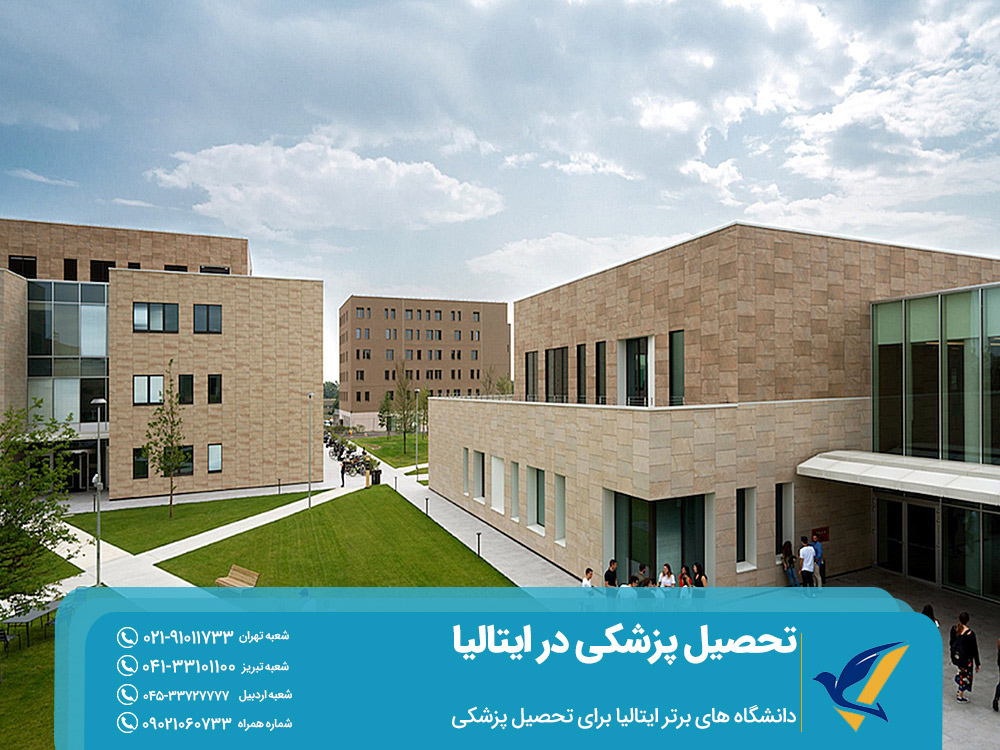Studying medicine in Italy is a suitable, affordable option with a reputable academic degree for many international students. As studying abroad becomes more popular, many students strive to continue their education at prestigious universities with reasonable costs.
The affordability and favorable conditions of studying medicine in Italy have made it an attractive option for this group of students. The presence of renowned and historic universities is another reason that justifies choosing Italy as a study destination. In this article by the Elm Vira Immigration Group, we explore various aspects and requirements of studying medicine in Italy. Stay with us.
Benefits of Studying in Italy
A significant number of Europe’s and the world’s oldest and most prestigious universities are located in Italy. The University of Bologna, where the well-known Bologna Process was initiated, is one of the most famous. Currently, 49 European countries and several reputable organizations have signed this educational agreement.
In addition, other respected universities in Italy offer various programs, including medical studies, with globally recognized degrees. Member countries of the Bologna Agreement follow higher education standards, which means their academic qualifications are internationally accepted.
Moreover, graduates can enter the job market in other Bologna signatory countries. Despite Italy’s high educational standards and excellent academic and scientific facilities, the cost of studying medicine in Italy is more affordable than in countries such as Australia, the UK, or the USA. The most important advantages of studying in Italy particularly studying medicine include:
- High-quality education
- Internationally recognized universities
- Various scholarship opportunities for students
- Affordable tuition and living expenses
- Access to Italy’s rich historical, artistic, and cultural heritage
- Entry into the international academic community and reputable job market
Regarding the cost of studying medicine in Italy, it varies depending on the chosen university, as each institution sets its own fees.

Requirements for Studying Medicine in Italy
Due to the sensitivity and importance of the medical field, specific regulations apply to medical universities worldwide. One of the most crucial requirements for studying medicine in Italy is passing the university entrance exam. Applicants must take the IMAT (International Medical Admission Test) and achieve a passing score.
One major advantage of passing the IMAT is that no interview is required; obtaining a passing score is sufficient for admission. Additionally, recommendation letters are not necessary for admission to medical programs in Italy. However, one important factor to consider is the age requirement.
Although Italian universities typically do not impose strict age limits for admission, age plays a significant role when applying for a student visa. An applicant may pass the entrance exam but still be denied a student visa due to being overage. Therefore, younger applicants have a better chance of receiving both admission and a visa.
Applicants aged 18 to 25 generally have a higher chance of securing a student visa for Italy. Another condition is the GPA requirement. While some Italian universities are flexible about GPA, others follow the UK educational system and require a minimum GPA of 3 out of 4. Thus, having a high GPA increases your chances of acceptance.
Other requirements for studying medicine in Italy include:
- Proof of English or Italian language proficiency
- Submission of the latest academic transcripts and diplomas with official translation
- A certificate of financial support to prove you can cover the costs of studying medicine in Italy
Important Note About the IMAT Exam:
International students must obtain a Diploma Validation (DV) from the Italian Embassy before applying for the IMAT exam. This is a required step for confirming the validity of your high school diploma.

Top Medical Universities in Italy
As mentioned earlier, Italian universities are among the oldest, most prestigious, and most well-established institutions in Europe and the world. Italy, known as the cradle of history, art, culture, and science, has produced many prominent figures who studied at its renowned universities. Medical education in Italy holds significant global recognition, and the country strives to stay in step with technological advancements alongside other developed nations.
Italian universities also aim to provide advanced academic, research, and student welfare facilities while ensuring that even international students with limited financial means can afford quality education. This approach has made the cost of studying medicine in Italy more economical and efficient than in countries like the US or the UK.
Top Universities in Italy for Studying Medicine:
- University of Turin
- University of Siena
- University of Bari
- University of Bologna
- University of Messina
- University of Milan
- University of Padua
- University of Pavia
- Università Cattolica del Sacro Cuore
- University of Milano-Bicocca
- Sapienza University of Rome
- University of Rome Tor Vergata
- University of Insubria
- University of Naples Federico II
- International Medical School (IMS), Italy
Studying at Italian universities recognized by the Iranian Ministry of Health is particularly valuable for Iranian students who plan to return home after graduation.
Advantages of Studying Medicine in Italy
In addition to its rich historical, cultural, and artistic legacy, Italy is a leading country in medical education. Its universities offer high-quality academic programs and uphold rigorous standards. As a result, medical graduates from Italian universities gain strong practical skills and enjoy excellent job opportunities both within Italy and abroad.
Furthermore, students are allowed to work during their studies, and the affordable cost of studying medicine in Italy makes it a highly attractive destination. Beyond academic benefits, students can enjoy Italy’s natural beauty, historical landmarks, and numerous cultural attractions.

Structure of the Medical Program in Italian Universities
The duration of medical studies in Italy is 6 years, divided into two main phases: pre-clinical and clinical.
- During the pre-clinical phase (the initial years), students focus on acquiring theoretical knowledge of fundamental medical sciences.
- In the later years, students move on to the clinical phase, which includes both theoretical coursework and practical training. This training involves internships and clinical rotations in hospitals, under the supervision of experienced professors and medical staff.
- To graduate with a Doctor of Medicine (MD) degree, students are required to dedicate one semester to writing a thesis and must defend it successfully at the end of the program.
Cost of Studying Medicine in Italy
As mentioned earlier, the cost of studying medicine in Italy is generally more affordable compared to many other developed countries. However, the tuition fees vary depending on the university.
- On average, public universities charge tuition fees of around €300 per semester, though in some cases, it may rise to €3,000 per year.
- For private universities, tuition fees typically range from €7,000 to €10,000 per year.
Because of this variation, it is crucial for applicants to check the official websites of their target universities or consult reputable immigration agencies to obtain accurate and up-to-date information on tuition and other costs.
In any case, a financial capability certificate (proof of funds) is required to demonstrate that the student can afford the tuition fees and living expenses during their studies in Italy.

Medical Scholarships in Italy
In addition to the high quality of medical education, Italy offers various attractive scholarships for international students. These scholarships can cover part or all of the tuition and living expenses:
1. Regional Scholarship (DSU)
- Designed for students with an annual family income under €50,000
- Scholarship amount: up to €6,000
- Highly competitive among applicants
2. MACI Regional/Government Scholarship
- Requires English language proficiency and academic merit
- Age limit: 28 years for Master’s students, 30 years for PhD students
- Scholarship amount: up to €9,000
3. University of Bologna Scholarship
- Scholarship amount: €11,000
- Requirements: high scores in SAT or GREs
- Maximum age: 30 years
🗣️ Language of Medical Studies in Italy
Medical studies in Italy are offered in both English and Italian. In either case, presenting a valid language certificate significantly increases your chance of admission. Studying in English generally costs more than in Italian.
Although students can study in English, it’s highly recommended to learn Italian as well, since clinical training and hospital internships often require communication in Italian.
Top universities offering medical programs in English:
- University of Milan
- University of Bologna
- University of Padua
- University of Brescia
- Sapienza University of Rome
- University of Genoa
- University of Milan-Bicocca
- University of Insubria
- University of Naples Federico II
- Vita-Salute San Raffaele University
✅ Italian Medical Universities Approved by the Iranian Ministry of Health
If you plan to return to Iran after graduation, studying at a university approved by the Ministry of Health is crucial. Some of the recognized universities include:
- Sapienza University of Rome
- University of Bari
- University of Brescia
- Catholic University (Università Cattolica)
- University of Florence
- University of Genoa
- University of Insubria
- University of Milan
- University of Naples
- University of Pavia
- University of Rome Tor Vergata
Let me know if you need this as a PDF, a brochure, or tailored for Instagram or a website.

📋 Steps and Required Documents for Studying Medicine in Italy
To study medicine in Italy, you must choose a suitable university based on your academic background, financial resources, preferred language of instruction, and other relevant factors. Begin by downloading the admission application form from your chosen university, filling it out, and sending it along with the required documents such as ID, academic transcripts, a valid passport, and proof of financial means.
Once you receive the university’s letter of admission, you’ll need to apply for a student visa for Italy and register by submitting the following documents:
Required Documents:
-
High school diploma and transcripts (officially translated)
-
Valid passport with the required minimum validity
-
Officially translated identification documents
-
Student visa for studying medicine in Italy
-
Medical certificate of good health
-
Certificate of no criminal record
-
Proof of financial means to cover tuition and living expenses
🧾 Summary
Medicine is one of the most popular and in-demand fields globally due to its strong job prospects. Many international students choose to study abroad not only to enter the global job market but also to participate in international academic and scientific communities.
Studying medicine in Italy is a highly suitable option thanks to the international reputation of its universities, high-quality educational facilities, and comparatively affordable tuition costs.
Because of this, educational migration to Italy is an ideal choice for many international students. Among the admission requirements for studying medicine in Italy are passing the IMAT entrance exam and submitting a valid language certificate in either Italian or English.
However, educational migration is a challenging and complex process, and working with reputable immigration institutions like Elm Vira can significantly increase your chances of success. The Elm Vira team provides secure, reliable guidance based on complete knowledge of studying abroad. To learn more and receive assistance, visit the Free Consultation section. Elm Vira’s advisors will contact you as soon as possible.
❓ Frequently Asked Questions
What is the age requirement for studying medicine in Italy?
There is no strict age limit, but applicants between the ages of 18 to 25 generally have a higher chance of admission.
How much does it cost to study medicine in Italy?
The cost varies from university to university. Tuition fees can range from €300 to €3,000 per semester at public universities, while private universities may charge between €7,000 to €10,000 per year.
Do Italian medical universities offer scholarships?
Yes. The most important scholarships include:
میانگین امتیازات 5 از 5
Vote count: 1 Vote